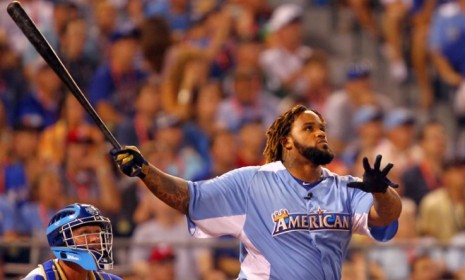6 ways to improve the MLB All-Star game
Baseball's midsummer classic is still a huge draw for faithful fans. But that doesn't mean they wouldn't like to see some changes...

A free daily email with the biggest news stories of the day – and the best features from TheWeek.com
You are now subscribed
Your newsletter sign-up was successful
Baseball fans still cherish the mid-season All-Star game between the National League and American League, but they aren't enamored with a decade's worth of tweaking to the annual game from Major League Baseball Commissioner Bud Selig. As MLB's best (or at least most popular) players gather in Kansas City for the midsummer classic on Tuesday night, sportswriters and other baseball fans offer Selig their unsolicited advice on how to return the All-Star game to its glory days. Here, six of their ideas:
1. Invite fewer players
Last year, the roster of the two All-Star teams exploded to a "ridiculously high" 84 players (some of whom didn't actually play, thanks to injuries), says Ian Mendes at the Ottawa Citizen. When you have so many players, the ones "we all want to see" — David Ortiz, Joey Votto, and Jose Bautista, for example — "will likely only get two at-bats," probably early in the game. Managers feel obligated to put everyone in, and since you can't re-field a player after he's been taken out, by the 9th inning, the game is decided by players who "don't really qualify as All-Stars." We want to watch the very best players perform, and that means MLB must shrink the rosters.
The Week
Escape your echo chamber. Get the facts behind the news, plus analysis from multiple perspectives.

Sign up for The Week's Free Newsletters
From our morning news briefing to a weekly Good News Newsletter, get the best of The Week delivered directly to your inbox.
From our morning news briefing to a weekly Good News Newsletter, get the best of The Week delivered directly to your inbox.
2. De-emphasize fan voting
Letting the people help select All-Star teams "remains one of the best ways to connect fans to the game," but unfortunately, fans aren't always great judges, says James Kries at Bleacher Report. There are "plenty of smart baseball statisticians and sabermetricians working in baseball and writing about baseball," and MLB should let them work their magic to pick the bulk of the All-Stars. "Fans can vote for the reserves": That way the people "still get their say," and viewers won't have to watch "head-scratchers" like the Atlanta Braves' Dan Uggla in the NL's starting lineup.
3. Ditch the World Series home-field advantage prize
Giving the winning All-Star league home-field advantage in the World Series was Selig's "not-so-brillant" solution to the disastrous 2002 All-Star game, which ended in a 7-7 tie after managers emptied their benches over 12 innings, says Bleacher Report's Kries. Selig's idea was that managers and players would have more incentive to win if there's a tangible reward. That hasn't worked, and it isn't fair. Home-field advantage should be decided by a season's worth of accomplishments, not some "exhibition game in July." "This failed experiment ... needs to stop immediately."
A free daily email with the biggest news stories of the day – and the best features from TheWeek.com
4. Stop insisting that every team is represented
The All-Star game "should be for the best of the best in that given year," says Alix Kunkle in Michigan's Sturgis Journal. You're not going to get that under the current rule that "every teams needs to be represented at the All-Star game," because not every team has an All-Star-caliber player. It would be nice for every team to have a least one guy in the game, but if a team doesn't, and its fans don't like it, "well, they should be complaining about their management team for putting a poor product on the field."
5. Schedule the game on the weekend
It makes no sense to have the game on a Tuesday night, says the Ottawa Citizen's Mendes. "All-Star games are meant for kids," but the 8 p.m. start time means most East Coast youngsters can only watch an inning or two at best. Honestly, "what's the harm in moving the game to a Sunday afternoon?" Other sports already do this because they recognize that the way to survive is to attract young viewers, and weekend afternoons are when they're most likely to watch.
6. Move it to cable
Fox spends "outlandish sums of money" for the right to broadcast baseball, and the All-Star game is "one of the key properties" the network pays for, says Tao of Steib. But Fox lards on so many "garish and unnecessary moments" that fans have to sit through 45 minutes of bad entertainment and desperate promos for Fox shows nobody's watching. That makes sense for Fox, but "the game belongs in a place where the focus will be on promoting the sport and creating a greater appreciation of baseball," and that's closer to ESPN's bailiwick. Moving the All-Star game to cable would make the game much enjoyable for faithful viewers, and "might even help baseball entice a few more fans to become engaged in the game every day." Isn't that the point of a showcase?
-
 Democrats push for ICE accountability
Democrats push for ICE accountabilityFeature U.S. citizens shot and violently detained by immigration agents testify at Capitol Hill hearing
-
 The price of sporting glory
The price of sporting gloryFeature The Milan-Cortina Winter Olympics kicked off this week. Will Italy regret playing host?
-
 Fulton County: A dress rehearsal for election theft?
Fulton County: A dress rehearsal for election theft?Feature Director of National Intelligence Tulsi Gabbard is Trump's de facto ‘voter fraud’ czar